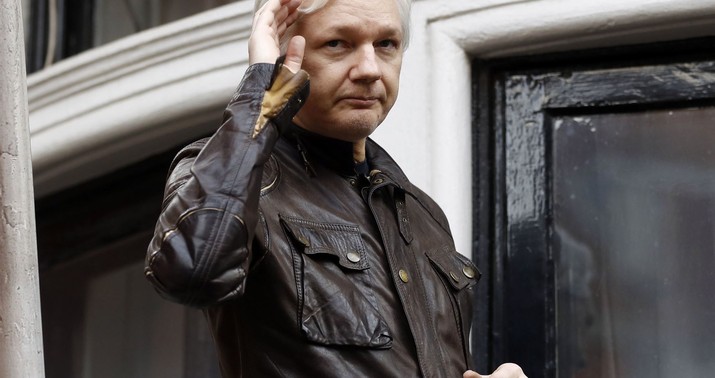Ecuador got the deal it wanted to end its six-year headache, but Julian Assange almost certainly did not. Ecuadorian president Lenin Moreno announced a deal that would allow Assange to leave their embassy in London in exchange for a guarantee not to face the death penalty. And that means … not much, really:
Ecuador’s president says Britain has provided sufficient guarantees for Julian Assange to leave his government’s embassy in London, where the WikiLeaks founder has been living under asylum since 2012.
Lenin Moreno said in a radio interview Thursday said his government had received written assurances from the U.K. government not to extradite the Australian activist to any country where he would face the death penalty.
That’s a guarantee without a purpose, and it’s not even a guarantee against incarceration. Moreno explained that the UK may well still prosecute Assange for skipping bail, even though he foresees any jail time as “not long”:
He noted that Assange still faces jail time in the United Kingdom for violating bail terms when he sought asylum to avoid being extradited to Sweden, where authorities wanted to question him as part of a sexual assault investigation.
The investigation was later dropped, but Great Britain says he will be arrested if leaves the embassy.
Moreno said the sentence for skipping bail would be “not long.” The UK has told Ecuador that his jail time would not exceed six months and that he would not face extradition if he left the embassy.
Note that Reuters cast this as any kind of extradition, while the AP report has Moreno qualifying it as restricted only in terms of the death penalty. That matters in Assange’s case; he thinks he’s under secret indictment in the US related to espionage charges, and he might well be. Wikileaks published the results of Bradley (now Chelsea) Manning’s indiscriminate theft of military and diplomatic cables, for which Manning got sentenced to more than thirty years in prison. (Barack Obama commuted his sentence after serving seven years of his sentence.)
That’s not the only case in which the US might indict Assange. He also figured in the publication of hacked material from the DNC, which the US believes was actually carried out by Russian intelligence. If the US really wants to prosecute Assange, they have plenty of material on which to draw.
And here’s the rub for Asssange. If Moreno got the UK to agree to refuse extradition under any circumstances, then Assange has no problem … as long as the UK doesn’t expel him at some point. If however it’s only limited to preventing a possible death-penalty sentence, then the US can settle that point right up front. While espionage and treason are two crimes for which the death penalty can be sought, it’s unlikely in the extreme that the US would seek it for Assange anyway. He can’t be tried for treason, since he’s not a US citizen or resident. In the Manning case, Manning is the one who committed the actual espionage, not Assange, and Manning didn’t get the death penalty. The same is true for the Russian hack of the DNC. Even if the US prosecuted Assange for espionage, it wouldn’t involve execution as an outcome. All the US has to do is publicly commit to not seeking the death penalty, and the UK can extradite him without breaking its commitment to Moreno.
Assange has to know that, too. Moreno’s remarks made it sound as though Assange could decide whether or not to leave the embassy; if that’s true, don’t expect him to exit, and I mean ever. Moreno’s been making it clear for months that he wants Assange out, though, so it’s almost certainly going to be voluntary only as to the timing. Once he’s out, Assange will eventually be making his way to the US whether he wants to do so or not.

